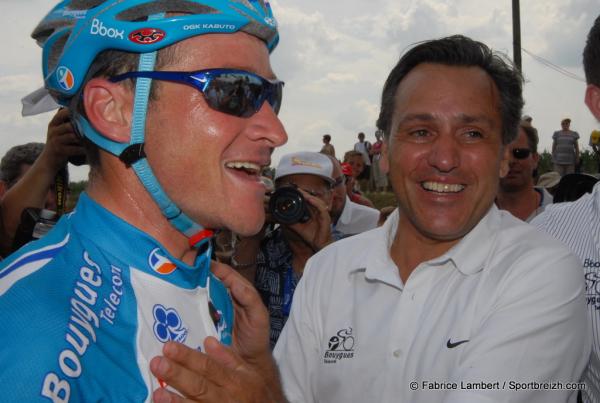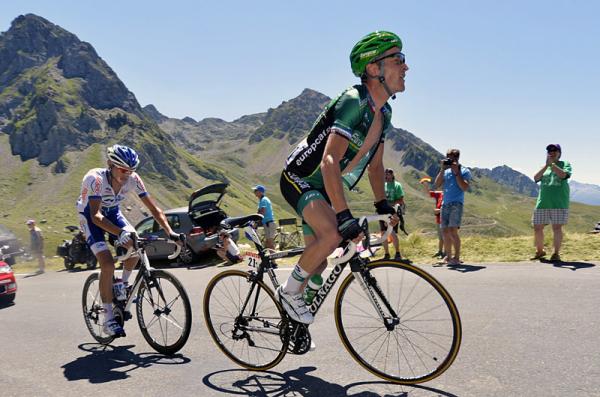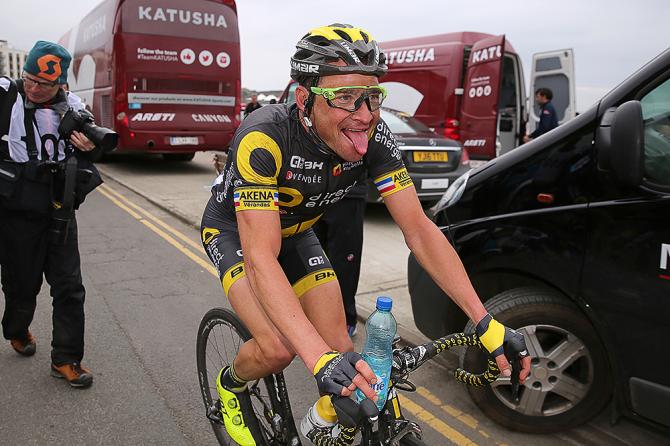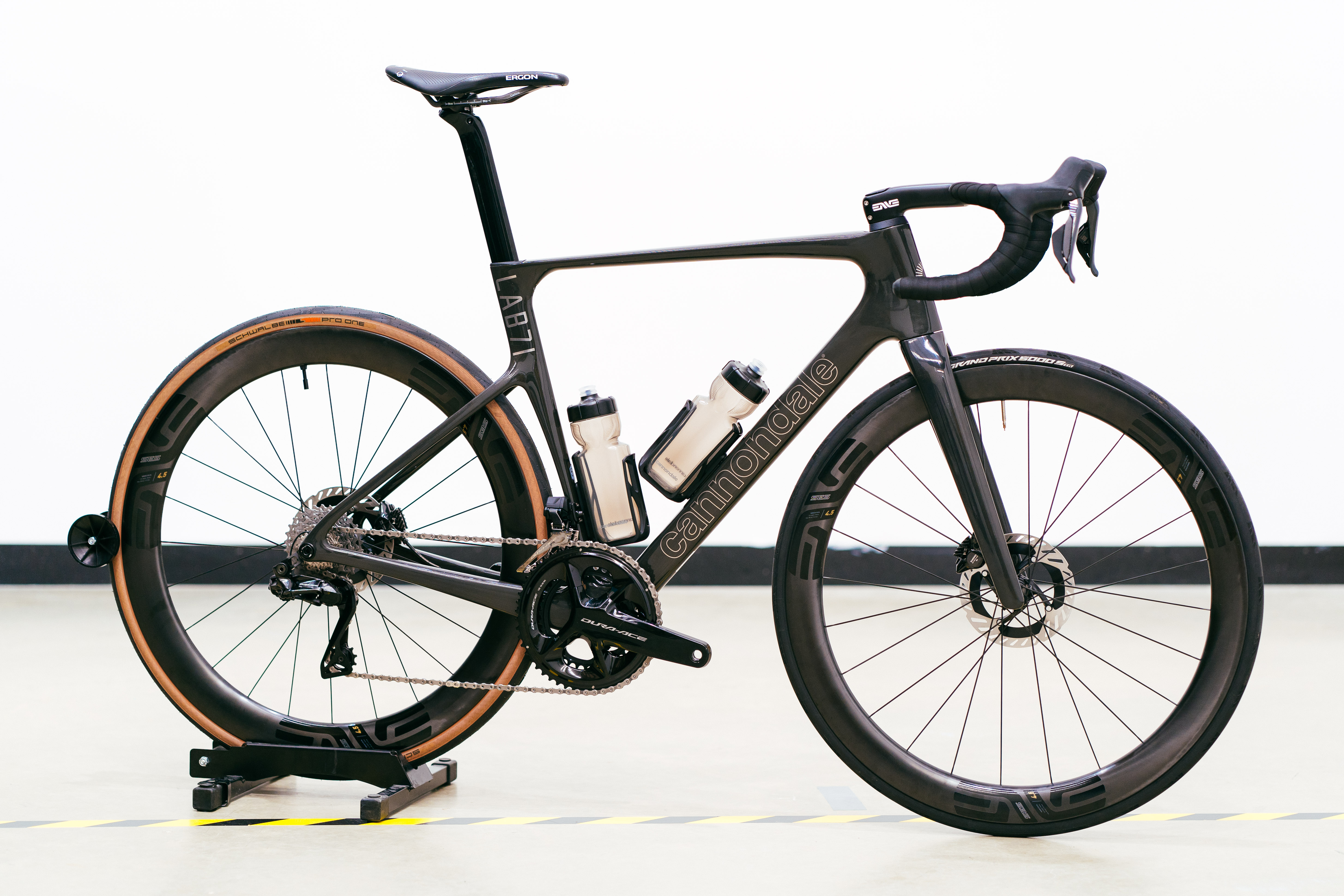Thomas Voeckler: I did it my way
Exclusive interview with the iconic Frenchman on a career lived to the full
The latest race content, interviews, features, reviews and expert buying guides, direct to your inbox!
You are now subscribed
Your newsletter sign-up was successful
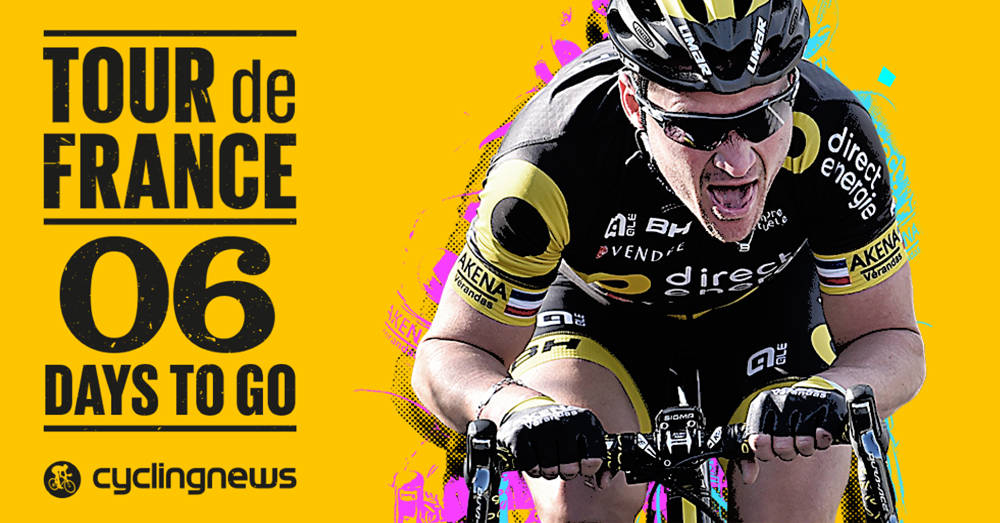
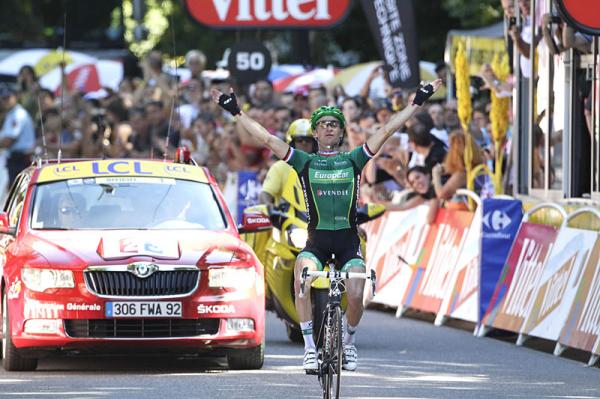
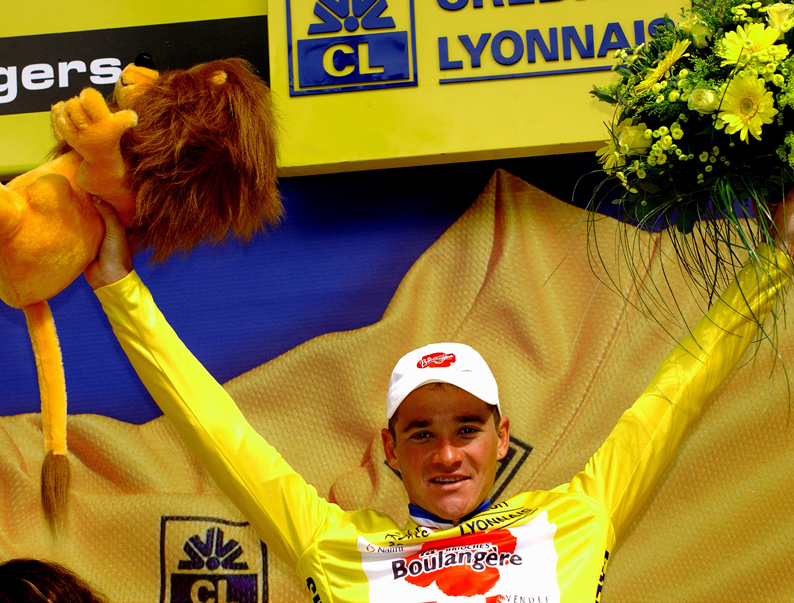

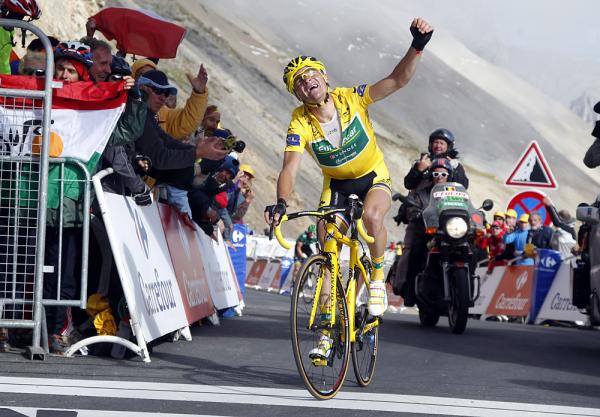
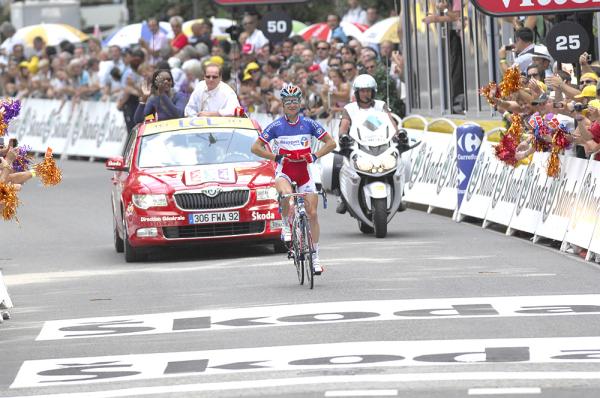
On the Champs Elysées on July 23, the curtain will fall on one of the most idiosyncratic careers in recent cycling history. Thomas Voeckler became a professional bike rider in 2001 with Jean-René Bernaudeau's Bonjour team, and has stayed there for the past 16-and-a-half years, over the course of which he won four stages of the Tour de France, spent 20 days in the yellow jersey, and was twice champion of France. Along the way there were plenty more victories and an even greater helping of breakaways, long-range attacks, and facial contortions.
Voeckler's has been a career lived to the full, and he has captured the imagination of the French public – and that of the international cycling audience – in a way few could even dream of. His popularity levels would seem more commensurate with a palmarès of, say, a Bernard Hinault, but he has flown the flag in a troubled period for France, and a survey last July cast him as still the most-admired home rider at the Tour, despite the presence of the 'new-guard' of Romain Bardet, Thibaut Pinot and others.
Voeckler attributes his popularity to his relatability. He is the humble character who has fought with every scrap of his potential, repeatedly defying the odds, his endlessly expressive face betraying every ounce of his effort and engaging fans in a way that heart rate and power data will never come close to matching.
During the recent Critérium du Dauphiné, Cyclingnews met with Voeckler one evening in Grenoble to discuss his career – the highs, lows, ifs, buts, and maybes.
***
Voeckler grew up in Martinique, and picked up cycling in spite of a distinct lack of family tradition. With opportunities limited on the island, he moved to mainland France to progress through the ranks, and turned pro in 2001 as a 21-year-old.
After struggling through that first year – "in the amateurs I had to suffer to win a race, and in the pros, I had to suffer just to follow the peloton," he says – his career soon started rolling, but 2004 was the year it took off. He won at the Route du Sud in June, and went on to become French national champion the following week. He took the tricolore jersey into his second Tour de France and traded it for the maillot jaune after a day in the break, defying expectations to hold onto it for 10 days.
The latest race content, interviews, features, reviews and expert buying guides, direct to your inbox!
"For me, there's always a before and after 2004," Voeckler says. "That Tour was what put me in the conscience of the French public as a whole – not just the cycling public. It was a huge change, not only in my sporting career, but also in my personal life."
Voeckler admits he had a hard time adapting to his newfound stardom.
"I wasn't prepared for it, I wasn't expecting it. I would walk down the street and people would stop me. All of a sudden you go from being anonymous to… I'm not a star but I was very popular all the same. It's not easy. I had a year in 2005 that was, let's say, complicated for me, because I always wanted to meet the expectations of the public. I felt like I had to constantly prove myself worthy of my status, and I was riding more to try to meet those expectations than anything else.
"It was in the head, saying 'I have to perform', and that became a bit of an obsession. It was difficult at times. I was 24, and it's maybe the only year where I became a bit big-headed. I was taking myself a bit too seriously. Until I said to myself 'come on, mate, you're only a cyclist, it's only sport, it's a profession like any other'."
The Tour de France would continue to define Voeckler's career, but he would be made to wait for his first taste of victory. Success, mostly in smaller races on home soil, followed in the years after his wobble, but it was only after years of knocking that the Tour de France door swung open in Perpignan in 2009.
"It was pure relief," he says of the moment he began to celebrate, having attacked his breakaway companions in the final few kilometres. "I'd started to think it might never happen."
The ball started rolling. He won solo in Bagnères de Luchon in 2010, and did exactly the same in 2012 – a Tour where he won a second stage from the break and also won the polka-dot jersey. But if those individual triumphs stand out, Voeckler will be remembered just as strongly, perhaps, for 2011.
"I never thought about winning the Tour, but I didn't see myself as a mere yellow jersey wearer who would go on to finish 50th," he says of the second of his two 10-day stints in the lead of the race. "I felt like it was my chance – the only time where I'd be able to get a GC result at the Tour de France."
In one of the most remarkable displays of dogged resilience seen in recent Tour history, Voeckler, who wouldn't have been given a chance at the start of the Tour, defended his lead against the more natural climbers all through the Pyrenees and into the Alps. He only came undone as Alberto Contador lit the fuse-paper two days from Paris, falling away on the Col du Galibier, the penultimate climb of the Tour, and off the podium by the finish atop Alpe d'Huez.
Yet the whole thing was sort of anti-Voeckler. He went from the front foot and onto the back one, his attacking and opportunism relegated in favour of the more prosaic demands of consistency, patience, and defence.
"I remember very well that towards the end of that Tour, I was itching for it to be over– mentally, rather than physically. It was so tough, mentally," Voeckler says.
"If we take the 2012 Tour, that resembles me better. Two stage wins, the polka-dot jersey - which represents panache - always in breaks, always fighting – that corresponds more with my way of racing."
Voeckler's Tour de France highlights
2009, stage 9
"I had chased that win for so long. It's also special because it was, on paper, a stage for the sprinters, and I managed to win from the break."
"I could also say Plateau de Beille in 2004, when I kept the maillot jaune by 22 seconds. Everyone, including myself, thought that was my last day in yellow."
2010, stage 15
"I was wearing the French champion's jersey and I won in the Pyrenees. I'd had a bad start to the Tour, so to win like that, in the national champion's jersey at the Tour de France, on a beautiful mountain stage, was a really proud moment for me."
One team wonder
Thomas Voeckler is an example a rare breed in modern-day professional sport: a one-team man. It's rarer still in cycling, where the fragility of the business model means most teams don't even last the length of an individual career, and where short-term contracts mean the transfer market is ceaselessly bustling.
Yet Voeckler has ridden under Bernaudeau from the start, turning pro in the second year of the team's existence, and has stuck with him, through thick and thin, ever since. But it would be disingenuous to describe this as a case of unwavering loyalty.
"I did say to myself, one day, 'maybe I'll go to a foreign team'," Voeckler reveals. "It has to be said, for several years – and things have changed a bit since – foreign teams were more professional, in terms of training, equipment, and things, than French teams. But time went on, and I always felt at home in this team, and I never found a good reason, the right reason, to change teams. So I carried on."
After his breakthrough 2004 he had multiple offers from teams willing to buy out the remaining year on his contract – a move he felt would be "unfair" – but it was in 2010 that he came within a whisker of leaving the team.
It was October, Bouygues Telecom had announced they were ending their sponsorship, and Bernaudeau hadn't found a replacement. The team, it seemed, was destined to fold. Riders, naturally, were looking elsewhere, and Voeckler, with no fewer than 12 teams having shown interest in his services, had a full contract with Cofidis printed out, ready to sign.
"At the last minute, I said to Cofidis, 'Ok, but can we wait until 6pm this evening, because Jean-René has one last meeting today?' And at 2pm I had a phone call from Europcar, who said 'if you stay, we'll come on board as a sponsor.'"
Voeckler would have earned nearly twice as much at Cofidis, but friends and colleagues would have been out of work.
"I'm sure Cofidis would have been a good experience as well, but I think – no, I'm sure – I did what I did because the team would have ended if I'd have signed that contract."
A sense of responsibility, then? Guilt, even?
"I don't want to say 'ah, it's thanks to me that the team carried on, and all that'. Because a team is exactly that: a team. I waited so the team had a chance to survive, but I could afford to – I knew that in any case I'd have work. I didn't save the team – everyone did."
Bernaudeau found himself in the same predicament towards the end of 2015, as Europcar prepared to step aside, and if it was Voeckler the saviour five years previously, this time it was the sprinter Bryan Coquard. Yet the young Frenchman, despite the team's future being secure for another year, announced last month his intention to pursue his career elsewhere from 2018.
"I've known Bryan for a while and I've understood in his attitude he sees things differently," says Voeckler, with a tinge of disappointment but no hard feelings. As for Bernaudeau's strange response – to publicly threaten to leave Coquard at home during the Tour – "It's Jean-René's decision, but it's better when things are clearer, when we have reasons that we can all, as adults, understand."
While Coquard has spoken of Bernaudeau as if he was a father, Voeckler, somewhat surprisingly, says his relationship with his boss is, well, just that – "an employer-employee relationship". Nevertheless, the story they've lived through together is undeniably one contributing factor to the rich sense of identity Voeckler has accrued over the years. It's hard to imagine him riding for a different team, and it's a curiosity to imagine how his career might look now had he taken the plunge with a foreign team, or had he signed that Cofidis contract.
"I don't like to look back too much," he says. "People sometimes ask me, 'since you already finished fourth at Liège, fifth at Amstel, eighth at Flanders, along with wearing the yellow jersey at the Tour, they say, 'do you not regret never specialising in one area?'
"But throughout my career I rode my bike as I liked. That's to say, it was my way. I understand those who specialise, but that wasn't my way. I have no regrets. Maybe in certain areas I could have progressed, and maybe at a different team, but I always rode my way."
Two, even three, speeds
If Voeckler always did things his way, he was well aware that it was not the way of many of his contemporaries.
He has always insisted he has never doped, but spent the bulk of his career in an era in which illegal performance-enhancement was prevalent. He turned pro two-and-a-half years after the Festina Affair almost brought the Tour de France to its knees and, as he notes, "despite the declarations of a 'new dawn', every subsequent year more came out."
One theory that became popularised in the post-Festina haze was that of a 'cyclisme à deux vitesses' – cycling at two speeds. The French, it was said, had cleaned up their act, and struggled to compete as large swathes of the international peloton continued to dope.
"That did us no good at all, that state of mind, always saying that," says Voeckler, with a mix of anger and embarrassment.
"Yes, they were very complicated years for French cycling, but it would be unjust to say, because I'm French, that the French respect the rules and not foreigners. Then you have the other guys saying 'ah, the French, they're taking us all for cheats'. Yes, there were cheats, but also, maybe, French cheats.
"You have to accept that you're not going to have a Bernard Hinault coming through every year. You have generations. In my generation, we had [Sylvain] Chavanel, [Sandy] Casar, [Pierrick] Fedrigo, but there was a generational gap. In the last few years we've seen that the French reservoir is much stronger."
Nevertheless, five of the Tours de France ridden by Voeckler have been won by riders who have later been stripped of their titles – the first three courtesy of Lance Armstrong, then Floyd Landis in 2006 and Alberto Contador in 2010. Voeckler has ridden 14 Tours in total and in 10 of them there has been at least one rider above him who has been crossed off the final results sheet.
Was it not difficult, knowing he was competing against people who had an unfair advantage over him?
"No. I understood from a very early stage that there were things going on, but I also had my way of seeing things, my way of riding my bike. Was it difficult? Yes, physically. But mentally, I've always said to myself, 'it's not because there's someone disrespecting the rules that I'm going to have my dreams taken from me'.
"If ever you throw in the towel, they win. They win twice. So, no, I never had difficulty, psychologically, accepting it. I've never thought myself incapable of competing. I've always taken that out of my head because if you start thinking in a race 'so-and-so is stronger than me, he has to be doping', what does that achieve? I've never let that cross my mind."
Voeckler takes heart in his belief that he leaves the sport in a far better state than which he found it nearly 17 years ago.
"There was a cycling at two speeds," he acknowledges, "before the whereabouts system, before the biological passport, before EPO and blood transfusions were detectable. For sure, there were two, even three, speeds.
"Today, I think the proportion is completely inverse. It can't be said that there are no longer problems with cycling, but if we're still finding things from time to time it's also because we're looking properly. I really think, after seeing the old days, that cycling is in a much better state of health."
The final bow
Voeckler will bow out on the Champs Elysées in four weeks' time. The Tour de France has defined his career and it's a fittingly symbolic end.
Already, the murmurs have begun circulating in France of Voeckler being afforded the ceremonial honour of being allowed off the front of the peloton to lead onto Paris' iconic cobbled street.
"It's something that is done, but, honestly, that has no importance for me whatsoever," he says in response. "Last year I rode the Champs on the front of the peloton to set up the sprint for Bryan, even if he had a puncture in the end. If he goes to the Tour, and I have to work for him on that final stage, that would suit me much more – to end my career being active in the peloton, rather than with a lap of honour. I don't need that."
The Tour as a whole will be no lap of honour either. Voeckler may not be the force he once was but he's still capable of doing a job, even if that may be in the interests of others, rather than his own. As well as Coquard, the team has another young French talent in Lilian Calmejane, an all-rounder who has been seen as something of a successor to Voeckler.
"If I spend my Tour helping those guys, I'd be perfectly fine with that. My objective isn't a sporting result. I've been through everything at the Tour. I've had plenty of unforgettable moments. If I can get into some breaks or bag a result on a stage, of course I'd be happy, but what I want is to enjoy it, and to reach Paris proud, with no regrets."
The French public, however, will surely want to see one last exploit, one last roll of the dice, one last tongue-wagging, eye-bulging effort.
"Public pressure, I went through all that in 2005. Now, for me, public pressure doesn't exist. You ride your own way, and whether people like it or not, that's not something you get to choose. It's secondary."
It's unclear what life after the Champs Elysées hold for Voeckler. He mentions the well-trodden path of media work, and also ambassadorial work, but insists he doesn't see himself working for Bernaudeau, or indeed for any team, in the near future. He plans to take a step back and allow his perspective to change. He and his wife are expecting their third child in October, which should certainly occupy a good deal of time and emotional energy.
"My real party will be on the Tuesday when I'm with my family at home with my two children and my wife," he says, explaining that the post-Tour celebrations aren't all they're cracked up to be – "You've just done three weeks, the stage finishes at 7.30pm, and you drink two or three beers or champagnes and you're soon…gone!"
Voeckler will soon be gone, and only his legacy will remain. He says that public opinion is secondary, but it still matters to him. With circumstances seemingly allowing for a slightly trite final question, how would Thomas Voeckler like to be remembered?
"Quite simply, as a rider who always fought, who made the most of what he had and who never threw in the towel," he says. "A rider who had panache and who always had heart."
Patrick is a freelance sports writer and editor. He’s an NCTJ-accredited journalist with a bachelor’s degree in modern languages (French and Spanish). Patrick worked full-time at Cyclingnews for eight years between 2015 and 2023, latterly as Deputy Editor.
